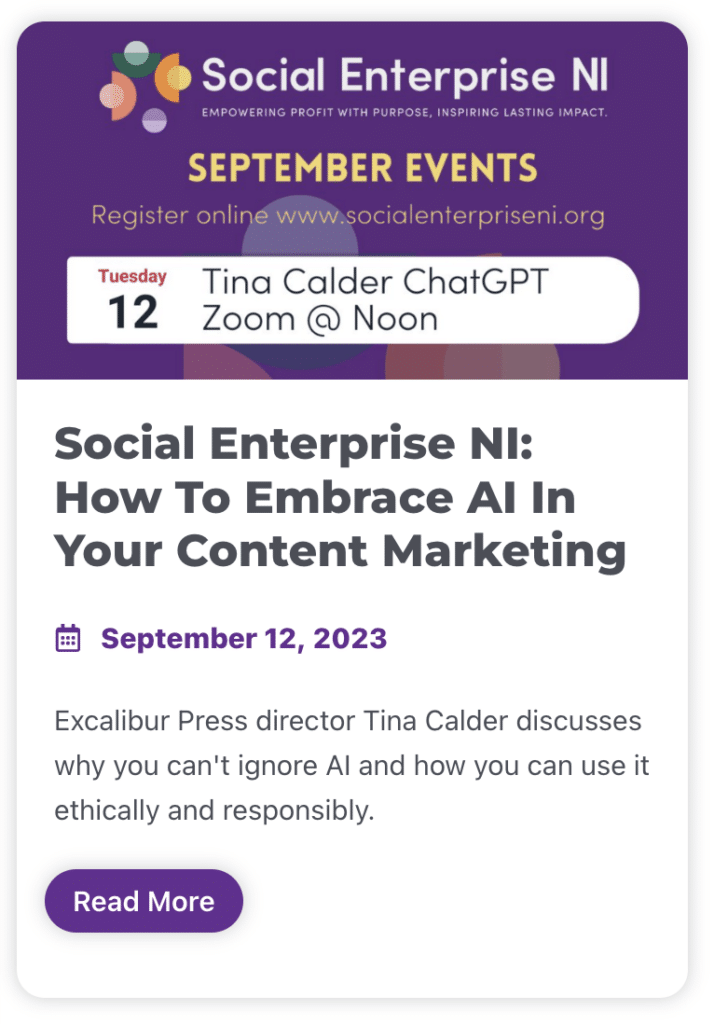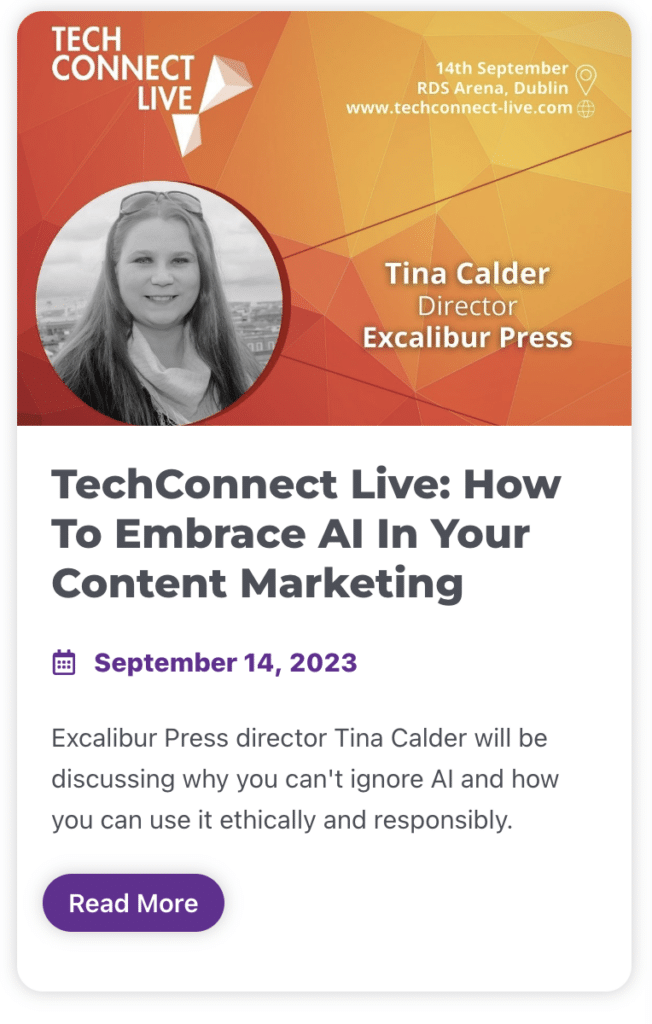The hype of AI isn’t going away and neither is the idea that it can “revolutionise” your marketing, especially if you’re the type of business that’s struggling to keep up with the demands practically and financially. However, the question really is: “why should businesses be embracing AI in your content marketing?”
Whilst it’s absolutely true that, used properly, AI can provide you with a vital resource which can reduce time spent on creating content it can also, however, have a negative impact on your business if used badly.
At Excalibur Press earlier this year (2023) we realised that AI wasn’t going away and tools like ChatGPT were going to continue to dominate the minds of not just many of our clients but also our staff and interns.
With that in mind we immediately put in place a constantly updated AI Usage Policy and AI Best Practice Guidelines. I knew that if I didn’t, it was definitely going to bite me in the ass.
We operate on the basis that working with AI must be ethical and professional, therefore, if we use AI for a client we inform that client. Afterall, ultimately the choice must be theirs as to whether they will accept content that has some form of input from AI platforms such as ChatGPT. Whilst the use of AI is not prohibited within Excalibur Press its use is strictly limited to being a research resource.
A word of warning
I wrote a blog in January of this year warning that ChatGPT was “for now nothing more than another research tool in the marketers arsenal and, if used properly, can certainly help to speed some elements of their workflow up”.
Whilst I have grown to understand the benefits of using the system a lot more, to the point that I now train in-house teams how to use it effectively, I still don’t believe it will ever be a replacement for an experienced marketer, copywriter or content creator.
In my last blog I cited the following as challenges in the use of AI copywriting tools in particular:
- Nuance and vernacular – the AI tools simply can’t get the right nuance and vernacular that I would use when writing. It doesn’t really have attitude. Yes, it can mimic an attitude and a style of writing but it’s a bit dad dancing at a disco or a mum using the aubergine emoji to mean an aubergine. It was just a bit “off”.
- Detail – in properly informed copywriting the devil is in the detail. It’s why you pay for research, expertise and experience and anything I managed to get out of the AI was simply surface level knowledge.
- Analysis – I couldn’t get real analysis out of the tool. That human thought process that brings context and humanity to what’s being written. For me, this is the deal breaker. It’s not that it can’t analyse information, it’s just it’s all surface level.
- Accuracy – it just simply couldn’t and didn’t give me relevant, correct or accurate examples when I asked it for them. The AI couldn’t tell the difference between a successful business on TikTok and a random business that was simply on TikTok. It also made suggestions that were out of date, ill informed and things that would be rather embarrassing if one of my writers turned in the content to me.
- Marketing copywriting – bottom line is I don’t feel the AI was able to replicate the sales focused copywriting that we do for many of our clients at Excalibur Press. The AI simply can’t deep dive into our client’s business, their customer mindset and the style in which the content needs to be delivered whilst considering the psychology of the customer journey, geographic and cultural considerations and – ultimately – the style the client likes to see their content presented in.
That said, it’s not all bad news. There’s certainly a right time and a right place for using tools like ChatGPT and, in my mind, it’s the same principle that I apply to Canva.
If the person using the tool is professional, knowledgeable and experienced enough they will have great success using the tool to optimise their workflow, speed up their brainstorming and research and, ultimately, assist them in delivering their expertise in a speedier manner.
However, what it is not, is a replacement for this professionalism, knowledge and experience.
The benefits of AI in content marketing
So what are the benefits of AI in content marketing? There must be some?
Absolutely there is. And you’d be a fool not to attempt to integrate it into your martech stack.
Embracing AI is not optional.
In all my research and in all my interrogating of the tool, here is what I think you need to see ChatGPT and other copywriting AI tools as:
- The intern you really want – if you brief it well enough, give it the right background and teach it enough information then AI copywriting tools can deliver you work that is definitely as good as a graduate intern. Whilst not always perfect, it’s much easier for us to edit and work with something that’s already on the page.
- The mentor you wish you had – sometimes you just want someone to ask questions to, check on past trends, ask about traditional tactics and strategies and learn from a brain full of knowledge. You don’t necessarily want this person to do the job for you, just be a sounding board that you can ask questions to that you may not want to be seen asking in the office.
- A half decent research tool – sometimes when you just need some quick information organised in a certain fashion so that you can see/read it all at one and quickly, AI can be your saviour. It’s always important for you to back up the research yourself to ensure it’s correct but it’s a great speedy resource for “on the go” information.
- Someone to brainstorm with – many people just don’t have the luxury of colleagues to be able to brainstorm ideas with, to figure things out and throw around some ideas to see what pops up. AI is great for this, it’s a brilliant space to brainstorm in a way where you’re leading the charge and you can quickly change the course of the brainstorm without offending anyone if it isn’t going the way you want it to.
- A great training resource – sometimes when I’m deep diving into a client’s business, and in particular a subject I’m not overly familiar with, I’ve found ChatGPT can be an excellent way of getting a Wikipedia style overview. Only this overview, if prompted correctly, will give you only what you want or need to know. It’s like having the clip notes to any subject you want.
- The colleague you don’t have – sometimes we just need a little help. Maybe you’re a team of one and getting someone to break the back of something could take some serious stress off your shoulders. An example might be that you want to write a blog for your website but you can’t get enough time to sit down and think properly. Some clever prompting with the right background info and you could get ChatGPT to spit out a blog outline or a description of the key points, all ready for you to add your expertise and specific product or subject knowledge and analysis.
- The cup of coffee you didn’t get and the jump start you needed – we all get tired and when you’re busy and stressed and you didn’t have time for that coffee your brain just gives up and grinds to a halt. Sometimes it just takes you to get one idea, line or concept clear in your head for you to get back on track. AI copywriting tools are great for this, they are a way to get you out of that funk

What happens when you get it wrong?
We had an entertainment client choose to replace us this year for their annual event and instead rely heavily on AI generated copy for their social media posts.
The first post that went up had three words spelt in American spelling and it and subsequent posts were filled with cheesy hyperbole that just did not fit the brand at all.
Some of the posts even spelt names wrong, used emojis in the wrong context and didn’t really get the local voice of the event that, for so many years, they were famous for.
It was clear from the posts that engagement was down and at one stage we noticed some of the events being cancelled or postponed.
I’m not saying this was just because of the AI generated posts, it’s a tough time for the entertainment industry, but I can certainly guarantee that the “voice” of the events not resonating with the audience would certainly have contributed to a downturn in attendance and engagement.
Ditch the hyperbole!
There is nothing worse than seeing social media content or blogs from professional companies that are full of hyperbole and over inflated flowery descriptions or use of language.
If you wouldn’t speak to a client like it on the phone you shouldn’t speak like it in your marketing.
I’ve seen multi-million pound companies utilise AI and suddenly every post they put up sounds like it’s being written by a 15 year old on Snapchat. There’s a very fine line between something being vibrant, fun, engaging and lively and something being childish, cheesy, off brand and a bit twee.
How do you make AI work for your content marketing?
In order to make AI work for you it’s important to figure out what you want it to help you with. So many people just jump in, open a new tab and say “create me 10 social media posts for a hairdressers”…
And what comes back is bland, generic content that doesn’t reflect the brand at all.
Think of ChatGPT and other AI copywriting tools as another member of staff. Consider what you want them to do, what you need out of it and how much time you have to commit to ensuring they are well briefed and that you have set time aside to edit, amend and review their content.
Consider getting some of the Excalibur Press training for in-house teams in order to see how best to use ChatGPT for your business or organisation, whilst it’s an investment of time and money it is something that may help you refine how you’re using AI before you end up stuck down the rabbit hole.
How can we help?
If you would like to speak to someone at Excalibur Press about how we can help you with training on ChatGPT or simply looking after your marketing, PR, copywriting, social media or content creation email me [email protected] or call 07305354209

** BONUS **
Top Tips for Prompting AI to Get the Best Results
At Excalibur Press we use a lot of techniques to improve the results we garner when using AI on behalf of our clients (with their permission). Below is an extensive, but not exhaustive, list of some of the tips our team use.
To get access to everything in our knowledge arsenal, don’t hesitate to contact us about training.
Be clear and concise
- Use specific and well-defined prompts that clearly communicate your request. This helps the AI understand your query and provide relevant responses.
Provide context
- Give enough background information or context when necessary, so the AI can generate more accurate and targeted content.
Use keywords
- Include relevant keywords and phrases related to your topic. This helps guide the AI towards generating content that matches your desired focus.
Experiment with different prompts
- If the initial output isn’t satisfactory, try rephrasing your prompt or using different keywords. AI tools can be sensitive to input variations, and small changes can lead to better results.
Break down complex queries
- If you have a complex question or request, break it down into smaller, more manageable parts. This can help the AI focus on each aspect and generate more accurate responses.
Limit response length when needed
- If you’re looking for a brief response or summary, specify the desired length in your prompt (e.g., “Provide a 100-word summary of…”).
Use step-by-step instructions for complex tasks
- For tasks that require a specific structure or format, provide step-by-step instructions in your prompt. This helps guide the AI through the process and ensures that the output matches your requirements.
Be patient and iterative
- AI tools may not always provide the perfect response on the first try. Be patient and willing to iterate on your prompts and experiment with different approaches to get the best results.
Learn from examples
- Provide examples of the desired output or style when appropriate. This can help the AI understand your expectations and generate content that aligns with your requirements.
Review and refine
- Always review AI-generated content for accuracy, relevance, and quality. Use the output as a starting point, and refine it as needed to meet your standards and objectives.
Adjust tone and formality
- Specify the desired tone or formality level in your prompt (e.g., “Write an informal blog post about…” or “Explain the concept in a professional manner…”). This helps the AI tailor its output to match the intended style.
Ask follow-up questions
- If the AI’s response isn’t complete or misses some details, ask follow-up questions to obtain more information or clarify specific points.
Leverage templates
- For repetitive tasks or specific formats, create templates with placeholders for the AI to fill in. This can streamline your workflow and help maintain consistency across your content.
Encourage creativity
- If you’re looking for creative ideas or unique perspectives, prompt the AI with open-ended questions or challenges (e.g., “Imagine a futuristic marketing campaign for…”).
Combine prompts
- If you have multiple questions or requests related to a topic, combine them into a single prompt to help the AI generate a more cohesive and comprehensive response.
Set a time frame or scope
- When seeking information or insights about a specific time period or scope, include it in your prompt (e.g., “Describe the impact of social media on marketing in the last five years”).
Use guiding questions
- Incorporate guiding questions within your prompt to help the AI focus on specific aspects of the topic (e.g., “Discuss the benefits of remote work, including cost savings, flexibility, and work-life balance”).
Specify desired format
- If you need the AI-generated content to follow a particular format, such as a list or a Q&A, make it clear in your prompt (e.g., “List the top 10 marketing strategies for e-commerce businesses” or “Answer the following questions about digital marketing trends…”).
Address potential biases
- Keep in mind that AI tools may inadvertently generate content with biases. If you notice a bias in the output, rephrase your prompt or ask the AI to consider alternative perspectives to ensure a balanced response.
Iterate and learn from experience
- As you use AI tools more frequently, you will learn which approaches and prompts work best for your specific needs. Continuously refine your prompting techniques based on your experiences to optimise the AI’s performance over time.
Let our team help you?
If you would like to speak to someone at Excalibur Press about how we can help you with training on ChatGPT or simply looking after your marketing, PR, copywriting, social media or content creation email me [email protected] or call 07305354209



